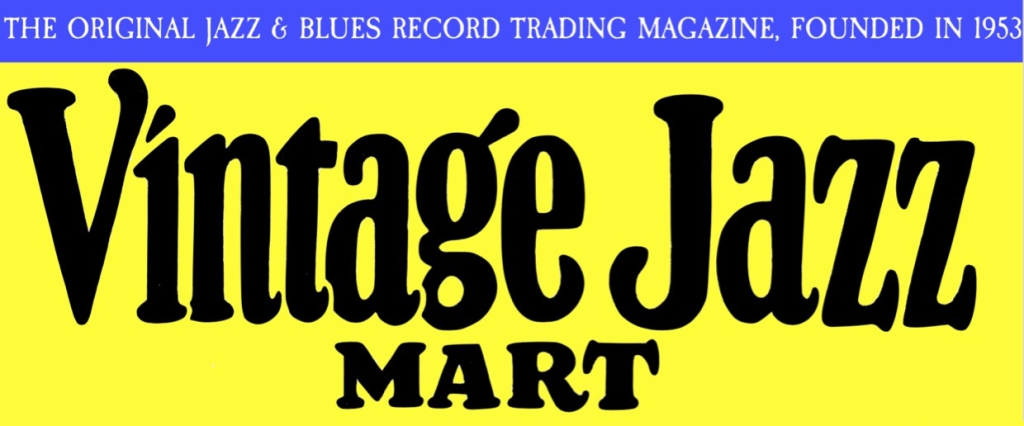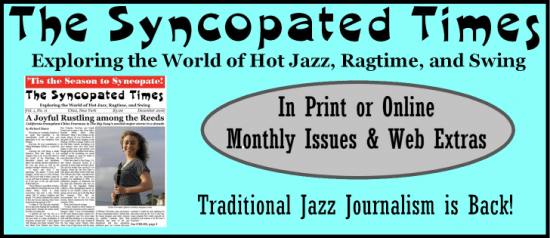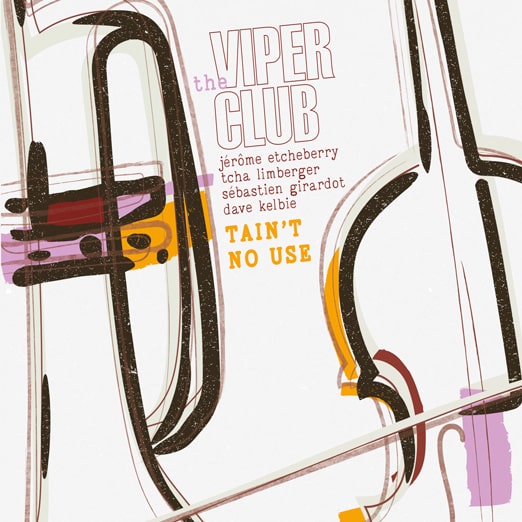If you were to measure jazz ensembles by their ability to adapt to contemporary media, THE KRAZY KAPERS would get high marks. They have a Bandcamp page , which I wll be returning to in this post. They have a Facebook page.
They have a whimsical caricature-logo, drawn by double bassist Raphael Dever:

that is part of their cover art for their debut CD:

and they do interesting visual presentations:
But unlike some bands who seem to focus all the energies on “merch,” band t-shirts and pinback buttons, THE KRAZY KAPERS make astonishingly rewarding music. To use an old advertising phrase, the steak is even better than the sizzle. I am going to take a risk and suggest two monumental sources of inspiration for this CD. One:
the 1933 masterpiece, an improvisation on the harmonies of DIGA DIGA DOO by Benny Carter, Max Kaminsky, Floyd O’Brien, Chu Berry, Teddy Wilson, Lawrence Lucie, Ernest Hill, and Big Sid Catlett . . . if you don’t know this record, go listen. We’ll wait.
And behind that masterpiece is George Herriman’s subversive creation, KRAZY KAT:
The brief liner notes to this disc state (as far as I can read French) that their inspiration is the Bobby Hackett – Vic Dickenson quintet of sainted memory, and that sits very well with me. I actually saw this group several times and they were a high point of the Seventies. But that quintet had a standard rhythm section of piano, double bass, and drums. The Krazy Kapers have guitar and bass, so I propose other antecedents: the Ruby Braff-George Barnes Quartet, and the various drumless / pianoless recordings made for the HRS label: Sidney Bechet – Muggsy Spanier; Rex Stewart – Barney Bigard – Django Reinhardt; Buck Clayton’s Big Four.
Wherever The Krazy Kapers come from, and they come from many places, they are wonderful.
The Kapers are Benoît de Flamesnil, trombone; Jérôme Etcheberry, trumpet; Félix Hunot, guitar; Raphaël Dever, double bass. And they offer music with noble lineages (both composers and performances) that isn’t heard all that much: Noone, but not SWEET LORRAINE or I KNOW THAT YOU KNOW; Ellington and Hodges, but not SATIN DOLL or LUSH LIFE; Bechet, but not PETIT FLEUR. Vic Dickenson, but not SISTER KATE or IN A SENTIMENTAL MOOD. You understand.
DEEP TROUBLE / A GYPSY QWITHOUT A SONG / MANHATTAN / CONSTANTLY / JOE LOUIS STOMP / AWFUL SAD / KRAZY KAPERS / WHERE OR WHEN / GOOD QUEEN BESS / LASTIC / ROSE OF THE RIO GRANDE.
Here are two performances I love. Listen to what these creators do with this material. Please note that these aren’t “blowing sessions” but carefully created pieces, whether head arrangements or on paper, that allow the soloists delightful freedom, but something interesting is going on in every half-chorus, backgrounds and figures that suggest a tiny big band, with no dull spots:
Richard Rodgers’ WHERE OR WHEN has a quiet intensity I associate with the Hackett-Teagarden I GUESS I’LL HAVE TO CHANGE MY PLAN. When I first got the CD, I played this track so often that had it been a Fifties record, it would be graying by now. And a riotous ROSE OF THE RIO GRANDE.
What shines through here, as your ears will tell you, is that these four musicians are immensely talented, ready to solo eloquently or to support one another in ensembles in the best way . . . and they are themselves.
That sounds too simple: of course, we “are ourselves,” but in the world of hot music, with the Ancestors standing hundreds of feet tall, with OKehs and Victors casting huge shadows over our puny selves, the instinct to imitate is very powerful and can be crippling. A musician who approaches an Ellington composition with love and reverence may have to work hard to not imitate Cootie, Rex, or Barney, because it, at first, seems the deepest homage, and evidence of mastery.
But the wise musicians, and the Krazy Kapers are very wise, honor the innovators by hewing to the conventions, those that are durable, but shining their infividualities within them. Honoring Bobby or Vic, thus, on this recording, doesn’t mean playing Bobby or Vic’s notes: it means creating something that the great Ancestors would admire, permeated in every way with living, breathing individuality.
This disc is a lovely and fulfilling creation. I hope it’s the first of many Kapers.
May your happiness increase!



















